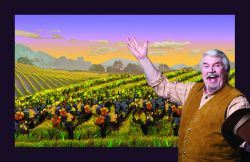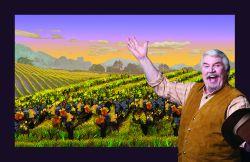
When The Most Happy Fella, Frank Loesser’s 1956 musical adaptation of Sidney Howard’s 1925 Pulitzer Prize–winning play They Knew What They Wanted, opened in New York for what was to be a long run — 20 months — New York Times critic Brooks Atkinson wrote that Loesser had “come about as close to opera as the rules of Broadway permit.” It’s been revived on Broadway, and by New York Opera in 1991. And now it’s headed for the East Bay, near where the musical is set in the wine country.
Brian Staufenbiel, stage director for Festival Opera’s new production of The Most Happy Fella, conducted by Bryan Nies, opening Aug. 6 at the Lesher Center in Walnut Creek, remarked: “Loesser knew he was mixing genre when he said, ‘I may give the impression this show has operatic tendency. If they feel that way, fine.’“ Loesser went on to say, “Actually, all it has is a great frequency of songs. It’s a musical with music.”
One of the show’s more than three dozen tunes gained old-chestnut status ages ago: “Standing on the Corner Watching All the Girls Go By.”
Featured Video
Loesser is best-known for the Tony Award–winning musicals Guys and Dolls and How to Succeed in Business Without Really Trying (also a Pulitzer Prize–winner, and currently running on Broadway), and for a slew of tunes and their lyrics from both Broadway and Hollywood, including “Baby, It’s Cold Outside,” an Oscar nominee, and “See What the Boys in the Backroom Will Have,” for Marlene Dietrich in Destry Rides Again.
It’s appropriate that the story of an older 1920s Italian immigrant vintner in the Napa Valley, who proposes by letter to a young waitress who served him once in San Francisco, should be sung almost within earshot of its original North Bay setting.
Yet there’s more that’s appropriate to this production of Festival Opera’s 20th anniversary season: The lead role of Tony, the Napa vintner, will be sung by baritone Ted Weis, who created the company two decades ago.
Founder of both Arizona Opera (1971) and Festival Opera, Weis will be singing Tony for the fourth time, after debuting in the role in 1996 at Diablo Light Opera. Although he’s sung extensively in the Bay Area since his 1975 operatic debut with West Bay Opera in Palo Alto, Weis — a lifelong singer, who sang the George M. Cohan part in Yankee Doodle Dandy while in sixth grade — is by profession a physician, practicing internal medicine and nephrology at the John Muir Hospitals in Concord and Walnut Creek.
Tony’s triumph — that of an older man wooing a younger woman — Weis takes to heart ... as a singer: “All my life, as a baritone, I’ve been watching tenors have all the fun. They get all the great arias and they get the girl. They are the heroes of every show — but they don’t age well. So now, at my age, the baritone gets it all. I am the romantic hero of the show!”
Weis is 75.
Looking back on his three previous ventures in the role, Weis commented, “It’s a genuinely funny show — a genuinely heart-warming, loving show.... I’ve never met anyone who wasn’t smiling when they came out of it.”
Opposite Weis, in the role of Rosabella the waitress, is San Francisco soprano Shawnette Sulker, a veteran of three San Francisco Opera productions, who has sung extensively abroad.
The story of They Knew What They Wanted was adapted to film three times: first as a 1928 silent, The Secret Hour, with Jean Hersholt and Pola Negri; then in 1930 as A Lady to Love, with Vilma Banky and Edward G. Robinson, directed by the great Swedish filmmaker Victor Sjostrom during his Hollywood residency; and 10 years later in the best-known version, which restored the title of the original play, starring Charles Laughton with Carole Lombard in one of her final roles, directed by Garson Kanin, and shot on location in the Napa Valley.
The musical itself was partly financed by Lucille Ball and Desi Arnaz. An episode of their I Love Lucy TV series had them going to a sold-out performance of it, with three songs heard from the show. Apropos the title, Lucy and Desi’s onscreen friend Fred Mertz (William Frawley) remarked: “The guy is not married!”
The original play (and, to some degree, the film scripts) is chock-full of period political remarks and asides, which Loesser removed for his adaptation — for instance, Tony’s wealth comes from his illegal wine business during Prohibition; Joe, the ranch hand whose picture Tony inserts with his letter of proposal as his own, is a Wobbly, a member of the radical International Workers of the World (IWW) union — and other commentary about religion, race relations, immigration, and even abortion, circa the mid-1920s.
Of Festival Opera’s production, director Staufenbiel commented, “What better way to introduce opera to new audiences than with what Kurt Weill called an ‘American opera — a special blend of musical theater that would completely integrate drama and music, spoken word, song, and movement.’“

